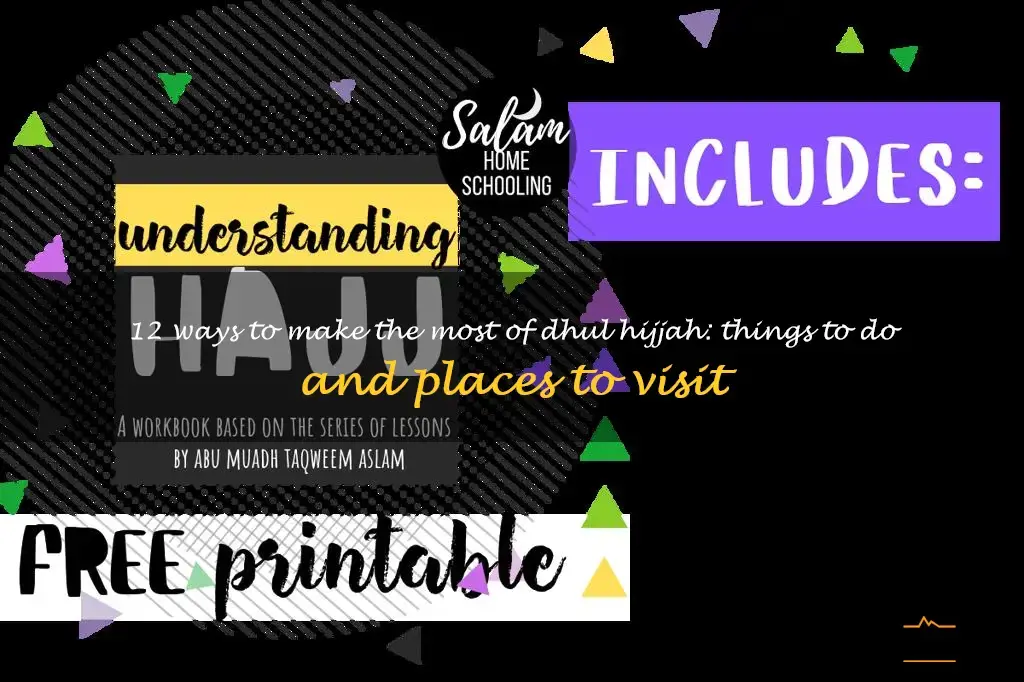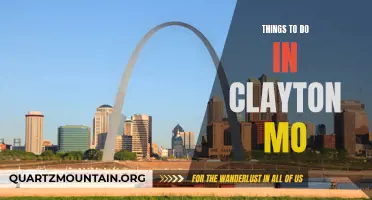
Dhul Hijjah, the last month in the Islamic calendar, holds great importance to millions of Muslims around the world. With the arrival of this holy month, Muslims embark on a journey of spiritual reflection and rejuvenation. As the pilgrimage season begins, millions of pilgrims flock to the holy city of Mecca to fulfill the fifth pillar of Islam – Hajj. But even for those who are not performing the Hajj, there are numerous ways to make the most of this blessed month. In this article, we'll share with you 12 Ways to Make the Most of Dhul Hijjah – from things you can do at home to places you can visit to seek peace and tranquility. So, let's dive right in and make this Dhul Hijjah a truly memorable one!
| Thing to do | Description |
|---|---|
| Perform Hajj | The fifth pillar of Islam where Muslims perform pilgrimage to Mecca. |
| Fast on the day of Arafat | Fasting on this day is highly recommended as it expiates the sins of the previous year and the coming year. |
| Offer Qurbani/Sacrifice | Muslims around the world sacrifice an animal to commemorate Prophet Ibrahim's willingness to sacrifice his son for the sake of God. |
| Increase in acts of worship | Strive to increase acts of worship like reading Quran, offering Salah and making dua. |
| Attend Eid al-Adha prayer and festivities | A celebration that marks the end of Hajj. Muslims gather to pray and share a communal meal. |
| Give charity and extend a helping hand to the needy | It is recommended to offer charity during this month to help those who are less fortunate. |
| Visit relatives and friends | It is also recommended to visit relatives and friends to strengthen the bonds of kinship. |
What You'll Learn
- Perform Hajj or Umrah (Mecca, Saudi Arabia)
- Fast on the Day of Arafah (worldwide)
- Offer sacrificial animal (worldwide)
- Increase your good deeds (in your local community)
- Donate to charity (in your local community or online)
- Read and reflect on the Quran (anywhere)
- Attend Eid prayer (your local mosque)
- Attend Dhul Hijjah lectures or seminars (your local mosque or online)
- Make dua (anywhere)
- Spend time with family and friends (anywhere)
- Visit historical Islamic sites (such as Masjid al-Qiblatayn and Quba Mosque in Medina, Saudi Arabia)
- Learn about the Prophet Ibrahim and his story (anywhere)

Perform Hajj or Umrah (Mecca, Saudi Arabia)
_20230519112951.webp)
Perform Hajj or Umrah in Mecca, Saudi Arabia
Hajj is the fifth and final pillar of Islam, and it is an obligation for every able-bodied Muslim to perform at least once in their lifetime. Umrah, on the other hand, is a voluntary pilgrimage that can be undertaken at any time of the year. Both Hajj and Umrah take place in Mecca, Saudi Arabia, and involve a series of rituals and practices that are deeply rooted in Islamic tradition.
Hajj is a massive undertaking, with millions of pilgrims converging on Mecca from all over the world each year. The pilgrimage takes place during the last month of the Islamic calendar, known as Dhul Hijjah, and it is divided into several stages. The first stage of Hajj is called Ihram, during which the pilgrims enter a state of purity and dress in simple white garments. They then proceed to the Grand Mosque in Mecca, where they perform a series of rituals, including circumambulating the Kaaba, running between the hills of Safa and Marwah, and spending a night in the tent city of Mina.
The next stage of Hajj is the day of Arafat, during which the pilgrims spend the entire day in supplication and prayer on the plains of Arafat. This is considered the most important day of Hajj, and it is believed that the prayers made on this day are especially powerful and can bring forgiveness and blessings from Allah. After Arafat, the pilgrims proceed to Muzdalifah, where they spend the night and collect stones, before returning to Mina to perform the ritual of stoning the devil.
The final days of Hajj involve the sacrifice of an animal, usually a sheep or a goat, to symbolize the willingness of Abraham to sacrifice his son to God. The pilgrims then return to Mecca to perform a final circumambulation of the Kaaba before the pilgrimage is complete. Hajj is a profound spiritual experience, and many Muslims describe it as a life-changing event that deepens their faith and brings them closer to Allah.
Umrah, by contrast, is a shorter and simpler pilgrimage that can be undertaken at any time of the year. The rituals of Umrah are similar to those of Hajj, but they are condensed into a shorter period of time and do not include some of the more challenging aspects of the Hajj pilgrimage. Umrah can be a great opportunity for Muslims to visit Mecca and deepen their faith without the intense physical demands of the Hajj pilgrimage.
In conclusion, performing Hajj or Umrah is an important part of the Islamic faith, and millions of Muslims make the journey to Mecca each year to undertake these pilgrimages. Hajj is a massive undertaking that requires a lot of physical and mental preparation, but it is a profound spiritual experience that can bring Muslims closer to Allah. Umrah is a simpler pilgrimage that can be undertaken at any time of the year and can be a great opportunity for Muslims to deepen their faith and connect with the history and traditions of Islam. Whichever pilgrimage one chooses to undertake, the experience of visiting Mecca and immersing oneself in the Islamic faith can be transformative and deeply rewarding.
13 Fun Things to Do in Park Slope, Brooklyn
You may want to see also

Fast on the Day of Arafah (worldwide)
_20230519113250.webp)
The Islamic month of Dhul Hijjah is one of great significance for Muslims all over the world. It marks the beginning of the Hajj pilgrimage, one of the five pillars of Islam. Millions of Muslims flock to the holy city of Mecca in Saudi Arabia to perform the Hajj, a journey that is considered the spiritual pinnacle of a Muslim’s life. However, for those who are not able to make the journey to Mecca, there are still many ways to commemorate this holy month and gain blessings from Allah (SWT).
One of the most important actions that a Muslim can take during the month of Dhul Hijjah is to fast on the Day of Arafah. The Day of Arafah falls on the 9th day of the month of Dhul Hijjah and is considered one of the most important days in the Islamic calendar. It is the day when the pilgrims in Mecca gather on the plain of Arafat to perform supplications and seek Allah’s forgiveness.
It is narrated in a Hadith that fasting on the Day of Arafah expiates the sins of the previous year and the coming year. Therefore, it is highly recommended for Muslims all over the world to observe a fast on this blessed day even if they are not performing the Hajj.
Fasting on the Day of Arafah is a voluntary act of worship, but it is highly recommended as it has immense rewards. It is important to note that fasting on this day is a means of seeking Allah’s mercy and forgiveness. Therefore, during this fast, one should increase their supplications and ask for forgiveness for their sins.
In addition to fasting, one can also perform other acts of worship during the month of Dhul Hijjah to increase their blessings and draw closer to Allah. These include offering voluntary prayers, giving charity, performing the Hajj if one is able, and reciting the Qur’an.
In conclusion, the month of Dhul Hijjah is a time of great importance for Muslims all over the world. Fasting on the Day of Arafah is a highly recommended act of worship that can lead to great rewards and blessings from Allah. Even if one is not performing the Hajj, they can still gain immense benefits from performing voluntary deeds and seeking Allah’s mercy and forgiveness during this sacred month.
12 Fun Things To Do In Highlands Ranch
You may want to see also

Offer sacrificial animal (worldwide)
_20230519113343.webp)
The month of Dhu al-Hijjah, the final month in the Islamic calendar, is significant for Muslims in many ways. It is during this month that the Hajj pilgrimage to Mecca takes place, marking one of the most significant events in the Islamic year. Along with the Hajj, it is customary for Muslims worldwide to also offer a sacrificial animal during the celebrations of Eid al-Adha.
Eid al-Adha, also known as the Festival of Sacrifice, commemorates the story of Prophet Ibrahim’s willingness to sacrifice his son, Ismail, for the sake of Allah’s command. As the story goes, as Ibrahim was about to perform the sacrifice, Allah provided a sheep to be slaughtered instead. The act of sacrificial animal offering on Eid al-Adha, therefore, symbolizes submission to Allah’s commands and brings about a sense of joy and celebration in the Islamic community worldwide.
The sacrificial animal is often a goat, sheep, cow, or camel. Muslims around the world purchase and prepare the animals in anticipation of the holiday, with the intention of redistributing the meat to the needy in their communities. However, it is important to note that the animal cannot be slaughtered before a certain time, which corresponds to the end of the Hajj pilgrimage in Mecca.
In terms of the process for offering the animal, Muslims are encouraged to follow a particular set of guidelines including selecting a healthy animal, performing the slaughter in a humane manner, and dividing the meat into three parts – one for the family, one for friends and neighbors, and one for the needy. There are also specific prayers that should be recited during the sacrifice.
Despite the rising prominence of plant-based diets, Eid al-Adha serves as a reminder of the profound cultural and religious significance placed on the act of animal sacrifices in some societies. For Muslims worldwide, offering a sacrificial animal on Eid al-Adha is not only a religious obligation but also a demonstration of compassion and charity towards those in need.
In conclusion, the offering of a sacrificial animal during Eid al-Adha is a significant tradition for Muslims worldwide during the month of Dhu al-Hijjah. It is an embodiment of the spirit of sacrifice, obedience, and charity, all of which are paramount in the Islamic faith. As we celebrate this year’s Eid al-Adha, it is important to remember the central role that this act plays in our spiritual and cultural practices, as we seek to honor Prophet Ibrahim’s sacrifice and to serve those in our communities who are less fortunate than ourselves.
10 Fun Activities to Enjoy on Labor Day Weekend
You may want to see also

Increase your good deeds (in your local community)
_20230519113451.webp)
Dhul Hijjah is one of the most sacred months in the Islamic calendar. It is a time when Muslims from all over the world gather to perform the Hajj pilgrimage in the holy city of Mecca. While only a select number of Muslims are able to make this journey, the rest of us can still take this time to increase our good deeds and earn rewards from Allah (SWT). One way to do this is by focusing on serving our local communities.
In Islam, community service is just as important as the practice of prayer and fasting. It is a way for us to give back to society and show our gratitude to Allah (SWT) for the blessings we have. There are many ways that we can serve our local communities during the month of Dhul Hijjah. Here are a few ideas:
- Volunteer at a local shelter or food bank - Many people in our communities struggle with homelessness and poverty. Volunteering at a local shelter or food bank can make a big difference in their lives. You can assist with serving meals, sorting and distributing donations, or helping with clean-up.
- Visit the sick - Visiting someone who is ill is a highly encouraged practice in Islam. During Dhul Hijjah, take some time to visit a friend or family member who is sick. You can also volunteer at a hospital or elderly care home.
- Clean up your community - Litter and debris can accumulate in our neighborhoods, making them unsightly and unhealthy. Grab a few friends or family members and organize a community clean-up. You can pick up trash, plant trees, or beautify a local park.
- Hold a fundraiser - There are many worthy causes that could use our support during Dhul Hijjah. Consider holding a fundraiser to support a local charity or relief organization. You can host a bake sale, a car wash, or a charity walk/run.
- Educate your community - Many people in our communities have misunderstandings about Islam. Take this opportunity to educate your neighbors and colleagues about our faith. You can host a lecture or a discussion group, or even just engage in friendly conversation with those around you.
Remember that the rewards for good deeds are multiplied during the month of Dhul Hijjah. By serving our local communities, we not only help those in need but also strengthen our own faith and relationship with Allah (SWT). Let us make the most of this sacred month and increase our good deeds in every way possible.
10 Best Activities & Attractions in Emlenton, PA
You may want to see also

Donate to charity (in your local community or online)
_20230519113702.webp)
The month of Dhul Hijjah is a significant time for Muslims all around the world. It marks the end of the Islamic year and the beginning of a new one. Muslims perform the Hajj pilgrimage during this month, and those who cannot attend the pilgrimage engage in other Islamic activities. One of the commendable activities that Muslims can participate in during this month is donating to charities.
Charity is one of the pillars of Islam. Giving money or goods to the less privileged is an act of kindness that is highly rewarded by Allah. During Dhul Hijjah, Muslims are encouraged to give in charity to the extent that it becomes a part of their daily activities. Muslims can donate money, food, clothing, and any other items they can afford to give to people in need.
A good deed in Dhul Hijjah is multiplied many times over. For this reason, donating to a charity in your local community or online is recommended during this month. There are many charitable organizations worldwide where people can donate money or goods. The simplest way to donate is to find a local charity organization and support them with your contributions.
In addition, Muslims can donate to online charity organizations. Online charities are a quick and easy way to donate money or goods. There are many authentic online charity organizations that help people in need worldwide. It's always crucial to do proper research before donating to any online organization to avoid scams or fraud.
Donating to charity during Dhul Hijjah has many benefits. Firstly, it is a way of showing gratitude to Allah for all the blessings that he has bestowed upon us. It also portrays a sense of compassion towards the less privileged in the society. Moreover, charity eliminates poverty and provides hope to struggling families. It is every Muslim's responsibility to ensure that they assist and support those in need.
In conclusion, donating to charity during Dhul Hijjah is a virtuous act in Islam. Muslims should prioritize helping people in need, whether in their local community or online. Charitable giving helps eliminate poverty, provides hope, and portrays compassion to those in need. Muslims should use Dhul Hijjah as an opportunity to increase their donations and carry out their Islamic responsibility of helping others.
14 Fun Things to Do in Whittier, California
You may want to see also

Read and reflect on the Quran (anywhere)
_20230519113900.webp)
The month of Dhul Hijjah is one of the most blessed months in the Islamic calendar. It is the month in which Muslims around the world undertake the sacred pilgrimage of Hajj and perform various acts of charity and good deeds. One of the most important acts that Muslims should perform during this month is reading and reflecting on the Quran.
The Quran is the holy book of Islam, revealed to Prophet Muhammad (peace be upon him) over a period of 23 years. It contains guidance and direction for all aspects of life, and reciting and reflecting on its verses is considered to be one of the most meritorious acts in Islam.
Reading the Quran during the month of Dhul Hijjah holds particular significance as it provides an opportunity for Muslims to reflect on the importance of Hajj and the sacrifices made by the Prophet Ibrahim (peace be upon him) and his family. It is also a time to contemplate on one's own actions and the need for self-improvement in order to become a better Muslim.
One of the most significant chapters of the Quran that is recited during Dhul Hijjah is Surah al-Fajr. This chapter emphasizes the importance of worshiping Allah alone, being grateful for Allah's blessings, and the reality of the Day of Judgment. It serves as a reminder of the importance of staying on the path of righteousness and avoiding evil deeds.
Reading and reflecting on the Quran can be done anywhere, at any time. It is recommended to recite a portion of the Quran every day during this month, whether it's in the form of recitation or listening to recitation. This can be done while traveling, waiting in line, or even during a lunch break at work.
Moreover, it is important to understand the meaning of the verses and reflect on their significance in one's life. This can be done by reading the translation of the Quran and listening to lectures and tafsir (interpretation) by scholars who can explain the context and meaning of the verses.
In summary, reading and reflecting on the Quran is a crucial practice for Muslims during the month of Dhul Hijjah. It provides an opportunity to reconnect with Allah, contemplate on one's actions, and seek guidance for self-improvement. It is a practice that can be done anywhere and at any time, and its benefits are immeasurable.
14 Fun Activities to Experience in Carrollton, Ohio
You may want to see also

Attend Eid prayer (your local mosque)
_20230519114004.webp)
Dhul Hijjah is the 12th month of the Islamic lunar calendar and is marked by the annual pilgrimage to Mecca, known as Hajj. However, for those who are not undertaking the pilgrimage, there are still many ways to make the most of this blessed month. Attending Eid prayer at your local mosque is an important part of celebrating the end of Dhul Hijjah and is highly recommended.
Eid prayer is a special congregation prayer that takes place on the morning of Eid al-Fitr, which marks the end of Ramadan, and Eid al-Adha, which marks the end of Hajj and the celebration of Abraham's willingness to sacrifice his son as an act of obedience to Allah. The prayer is typically held in an open space or at a designated mosque and is led by an imam or prayer leader.
Attending Eid prayer is not just a religious obligation, but it is also an opportunity to strengthen the sense of community within the Muslim ummah. You will meet people from all walks of life and be surrounded by the spirit of joy and celebration. It is customary to greet one another with the words "Eid Mubarak," which means "blessed Eid" and exchange gifts and sweets.
The prayer itself consists of two rakats, or cycles of prayer, during which the imam recites verses from the Quran and leads the congregation in various postures, including standing, bowing, and prostrating. The prayer concludes with a sermon or khutbah, in which the imam will address the congregation and deliver a message of inspiration and guidance.
Attending Eid prayer is particularly important during Dhul Hijjah, as it marks the end of the Hajj pilgrimage. Those who have undertaken Hajj will have experienced a life-changing journey and developed a deeper connection with their faith. For those who could not make the journey, attending Eid prayer is a way to share in the spirit of Hajj and renew their commitment to Islam.
In conclusion, attending Eid prayer at your local mosque is a significant part of the celebration of Dhul Hijjah that should not be missed. It is an opportunity to come together with your community, reflect on the blessings of Allah, and strengthen your faith. So, make sure to mark your calendar and join the congregation on the morning of Eid al-Adha. Eid Mubarak!
12 Fantastic Fun Things to Do in Schaumburg
You may want to see also

Attend Dhul Hijjah lectures or seminars (your local mosque or online)
_20230519114122.webp)
Dhul Hijjah is one of the most important months in the Islamic calendar. It is the twelfth and final month of the Islamic year, and it marks the time of the annual pilgrimage to the Holy City of Mecca. The pilgrimage or Hajj is one of the five pillars of Islam, and it is obligatory for all Muslims who are physically and financially capable of undertaking the journey. But even if you're not going for Hajj, the month of Dhul Hijjah is a time of immense spiritual and religious significance. One of the things you can do to enhance your knowledge and spiritual experience is to attend Dhul Hijjah lectures or seminars at your local mosque or online.
There are many reasons why attending Dhul Hijjah lectures or seminars is a good idea. Here are a few of them:
- Gain knowledge: Dhul Hijjah lectures or seminars are a great way to learn more about the significance and rituals of the Hajj, the history of Islam, and the legacy of Prophet Muhammad (PBUH). Whether you're a seasoned Muslim or a new convert, there's always something to learn.
- Boost your spirituality: The month of Dhul Hijjah is a time of spiritual reflection and devotion. Attending lectures or seminars can help you to deepen your spiritual connection to Allah and gain a greater understanding of the beauty and wisdom of Islam.
- Connect with the community: Attending Dhul Hijjah lectures or seminars is a great way to meet other Muslims and build connections with your local mosque or Islamic center.
- Prepare for Hajj: If you're planning to perform Hajj, attending lectures or seminars can help you to better understand the rituals and requirements of the pilgrimage. You can also get advice and guidance from experienced pilgrims and religious scholars.
There are many ways to find Dhul Hijjah lectures or seminars in your area. Here are a few tips:
- Check with your local mosque or Islamic center. Most mosques or Islamic centers organize lectures or seminars during the month of Dhul Hijjah.
- Look for online resources. Many Islamic organizations and websites offer online lectures or seminars during the month of Dhul Hijjah. Some popular options include Bayyinah, AlMaghrib Institute, and Islamic Relief.
- Ask friends or family members. If you have Muslim friends or family members, ask if they know of any lectures or seminars in your area.
In conclusion, attending Dhul Hijjah lectures or seminars is a great way to enhance your spiritual and religious experience during this important month. Whether you're going for Hajj or not, there's always something to learn and gain from attending these events. So take advantage of the opportunities in your area to gain knowledge, boost your spirituality, connect with the community, and prepare for Hajj.
12 Exciting Things to Do Uptown Dallas
You may want to see also

Make dua (anywhere)
_20230519114308.webp)
The month of Dhul Hijjah is a sacred time of the year for Muslims all around the world. It is a time when Muslims from all walks of life consecrate themselves to Allah and make every effort to become closer to the Almighty. It is also a time to make dua, or supplication, to Allah, to seek His blessings and mercy.
Dua is one of the most powerful tools at the disposal of Muslims. It is a way to communicate with Allah, to seek His help, guidance, and support. It is a way to express gratitude for Allah's blessings and to ask for forgiveness for one's sins. Dua can be made at any time and in any place. However, there are certain times when it is highly recommended to make dua, and the month of Dhul Hijjah is one of them.
The Prophet Muhammad (peace and blessings be upon him) said, "There are no days during which good deeds are more beloved to Allah than these days," referring to the first ten days of Dhul Hijjah. Therefore, it is incumbent upon Muslims to maximize their efforts during these days, to engage in acts of worship, and to make dua.
Making dua during the month of Dhul Hijjah can take many forms. Muslims can make dua during their daily prayers, in the mosque during congregational prayer, at home or even while traveling. Muslims can also make dua while sitting or lying down, while walking or driving, or while doing any other activity.
It is also recommended to make dua during the day of Arafah, which falls on the 9th of Dhul Hijjah. It is a great day of forgiveness, and Allah accepts the repentance of His servants. Therefore, Muslims should take advantage of this day to seek forgiveness, make dua, and perform acts of worship.
Making dua is a way to connect with Allah, to strengthen one's faith, and to remind oneself of Allah's infinite mercy and blessings. Therefore, Muslims should make the most of the month of Dhul Hijjah to increase their dua, to seek Allah's guidance, and to ask for His blessings and mercy. May Allah accept all our supplications and grant us success in this life and the hereafter.
10 Top Activities for a Fun-Filled October in Las Vegas
You may want to see also

Spend time with family and friends (anywhere)
_20230519114350.webp)
As the month of Dhul Hijjah approaches, Muslims all around the world prepare for the festivities of Eid al-Adha, also known as the Festival of Sacrifice. It is a time for celebration, reflection, and giving back to the community. However, amidst all the preparations and festivities, Muslims often forget an important aspect of this blessed month – spending quality time with family and friends.
In today's fast-paced world, it's easy to get caught up in our busy schedules. We often forget to take time out for the people who matter the most – our loved ones. But the month of Dhul Hijjah provides an opportunity to reconnect with family and friends, strengthen relationships, and create cherished memories that will last a lifetime.
Whether it's a simple get-together at home or a trip to a nearby park, spending time with family and friends can have a profound effect on our mental and emotional well-being. It provides a sense of love, belonging, and connection that cannot be found anywhere else.
During the days of Dhul Hijjah, there are endless opportunities to spend time with loved ones. From preparing for Eid together to attending community events, there's something for everyone. Families can come together to decorate their homes for Eid or prepare traditional dishes such as biryani and sheer khurma. Friends can plan a picnic in the park or a day out exploring the city.
Moreover, spending time with family and friends during the month of Dhul Hijjah can also serve as a reminder of the importance of sacrifice in Islam. It teaches us that the act of sacrificing is not just about slaughtering an animal, but also about sacrificing our time, effort, and resources to help others. Spending time with loved ones is a form of sacrifice in itself, as it requires us to put aside our busy schedules and prioritize our relationships.
In conclusion, as we approach the month of Dhul Hijjah, let's not forget the true essence of this blessed month – spending time with family and friends. Let's take the time to appreciate those who matter to us, strengthen our bonds of love and friendship, and create beautiful memories that will last a lifetime. After all, the happiness and contentment that comes from spending time with loved ones is a priceless gift that cannot be bought or earned – it can only be experienced.
13 Fun Things to Do Outdoors in Tampa
You may want to see also

Visit historical Islamic sites (such as Masjid al-Qiblatayn and Quba Mosque in Medina, Saudi Arabia)
_20230519114437.webp)
| Characteristic | Description |
|---|---|
| Name | Masjid Quba Madina |
| Type | Mosque in Medina, Saudi Arabia |
| Website | Go to website |
| Rating / Review count | 4.9 / 123,526 |
| Address | 3493 Al Hijrah Rd, Al Khatim, Al Madinah Al Munawwarah 42318, Saudi Arabia |
| Phone | +966 14 831 2441 |
| Hours | Friday - Open 24 hours Saturday - Open 24 hours Sunday - Open 24 hours Monday - Open 24 hours Tuesday - Open 24 hours Wednesday - Open 24 hours Thursday - Open 24 hours |
The month of Dhul Hijjah holds great significance for Muslims worldwide, as it marks the Hajj pilgrimage to the holy city of Mecca and the sacrifice of Eid al-Adha. However, the entire month is also an opportunity for Muslims to engage in acts of worship and draw closer to Allah.
One way to do so is by visiting historical Islamic sites, such as Masjid al-Qiblatayn and Quba Mosque in Medina, Saudi Arabia. These sites served as important landmarks in the early days of Islam and hold immense spiritual value for Muslims.
Masjid al-Qiblatayn is unique in that it was the location where the Prophet Muhammad (peace be upon him) received revelation from Allah to change the direction of prayer (qibla) from Jerusalem to Mecca. It is situated in the western part of the city and offers an awe-inspiring glimpse into the early days of Islam. The mosque underwent extensive renovations in the 20th century but still maintains its historical significance.
Quba Mosque, on the other hand, is the oldest mosque in Islam and was built by the Prophet Muhammad (peace be upon him) himself. He stayed in Quba for several weeks upon arriving in Medina and laid the foundation of the mosque before continuing his journey. The mosque underwent various renovations over the centuries and remains a prime destination for spiritual seekers.
Visiting these sites not only provides an opportunity for Muslims to learn about the history of Islam but also allows us to connect with our faith on a profound level. Walking in the footsteps of our beloved Prophet (peace be upon him) and visiting places where he received divine revelation can strengthen our iman (faith) and reinvigorate our spiritual journey.
In addition to these two mosques, there are several other historical Islamic sites worth visiting during the month of Dhul Hijjah. These include Masjid al-Nabawi (the Prophet's Mosque) in Medina, Mount Uhud, where the Battle of Uhud took place, and Masjid al-Haram in Mecca, where millions of Muslims flock every year for Hajj.
In conclusion, visiting historical Islamic sites during the month of Dhul Hijjah is a wonderful way to deepen our connection with Islam and strengthen our spiritual journey. These sites offer a glimpse into the early days of Islam and provide a unique opportunity to learn more about our faith. May Allah grant us all the chance to visit these holy places and strengthen our iman. Ameen.
12 Exciting Things to Do in Appenzell, Switzerland!
You may want to see also

Learn about the Prophet Ibrahim and his story (anywhere)
_20230519114550.webp)
Dhul Hijjah is the twelfth month of the Islamic calendar and is known as the month of pilgrimage or hajj. It is a very special and sacred month for Muslims all over the world. Muslims from all across the globe gather in the holy city of Mecca to perform the annual pilgrimage during this month. One of the most significant events associated with this month is the story of Prophet Ibrahim (AS) and his sacrifice.
Prophet Ibrahim (AS) is an essential figure in the Islamic tradition and is known as the father of the prophets. His story is mentioned in the Quran, and Muslims hold him in high regard for his unwavering faith and devotion to Allah. His story is a testament of submission, sacrifice, and unwavering faith in Allah.
Prophet Ibrahim (AS) was born in Mesopotamia (modern-day Iraq) and grew up in a household of idol worshipers. He started questioning the irrationality of worshiping lifeless statues and sought the truth. Allah showed him the path of guidance, and he accepted Islam. He migrated to Palestine, where he continued to spread the message of Allah.
One of his greatest acts of faith was the willingness to obey Allah's command to sacrifice his beloved son, Ismail. Allah had commanded in a dream to Ibrahim that he should sacrifice his son Ismail as a test of his devotion and obedience to Allah. After receiving the divine command, Ibrahim promptly informed his son of Allah's injunction which did not perturb Ismail.
Ibrahim and Ismail set out for Mina carrying a sharp knife for the sacrifice. As they were ready to begin the ritual, Allah sent Jibraeel to replace Ismail with a lamb. This was a test of Ibrahim's devotion and obedience to Allah. Prophet Ibrahim (AS) passed the test, and his obedience to Allah earned him Allah's pleasure.
Muslims commemorate this event each year during the festival of Eid-ul-Adha, which falls on the tenth day of Dhul Hijjah. During this festival, Muslims sacrifice an animal as a symbol of spiritual sacrifice and devotion to Allah. The meat from the sacrificed animal is distributed amongst others, including the poor and needy.
In conclusion, Prophet Ibrahim (AS) was an exemplary figure in Islam. His devotion, obedience, and unwavering faith in Allah are inspiring for Muslims all over the world. His story of sacrifice and submission is a reminder of the importance of fully submitting to Allah's commands and being faithful to Him. Muslims around the world commemorate his story during the month of Dhul Hijjah, and the festival of Eid-ul-Adha is a testimony of this ultimate act of faith and submission.
13 Fun Things to Do in Shaver Lake
You may want to see also
Frequently asked questions
- The most recommended act of worship during Dhul Hijjah is performing Hajj for those who are able. For those who are not performing Hajj, recommended acts include fasting on the Day of Arafah, giving charity, reading Qur’an, and performing extra prayers.
- Aside from Hajj, the first ten days of Dhul Hijjah are considered very important and full of blessings. Muslims are encouraged to increase their acts of worship during this time, particularly in the morning and evening. Additionally, Muslims observe Eid al-Adha on the 10th day of Dhul Hijjah, which involves performing a special prayer and sacrificing a halal animal.
- There are many ways to increase one's worship during Dhul Hijjah, even if Hajj is not feasible. Some examples include fasting on the day of Arafah, giving extra charity, reciting Quran, offering extra prayers, and making sincere dua. Additionally, this can be a time for reflection and self-improvement, as we strive to improve our faith and spirituality.








5 Comments
Rhea Cochran
Kryms Kaya
AuthorAnish Gilmore
Duke Trotter
AuthorEmil Mcintyre